中考英语语法3 反义疑问句
中考英语语法考点知识复习_反义疑问句
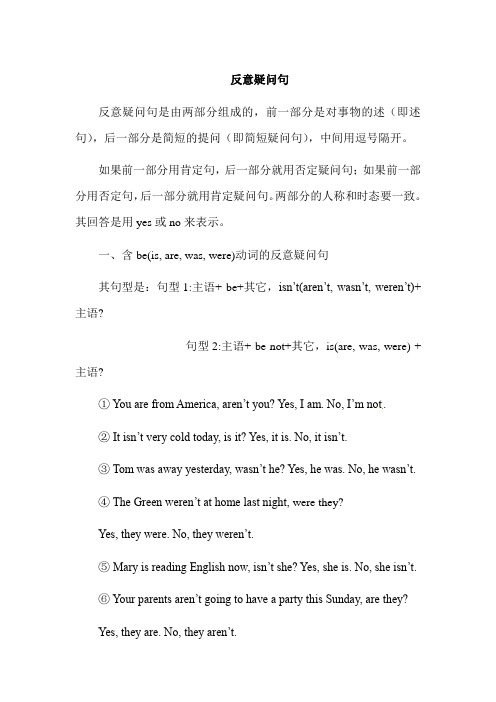
反意疑问句反意疑问句是由两部分组成的,前一部分是对事物的述(即述句),后一部分是简短的提问(即简短疑问句),中间用逗号隔开。
如果前一部分用肯定句,后一部分就用否定疑问句;如果前一部分用否定句,后一部分就用肯定疑问句。
两部分的人称和时态要一致。
其回答是用yes或no来表示。
一、含be(is, are, was, were)动词的反意疑问句其句型是:句型1:主语+ be+其它,isn’t(aren’t, wasn’t, weren’t)+ 主语?句型2:主语+ be not+其它,is(are, was, were) + 主语?① You are from America, aren’t you? Yes, I am. No, I’m not.② It isn’t very cold today, is it? Yes, it is. No, it isn’t.③ Tom was away yesterday, wasn’t he? Yes, he was. No, he wasn’t.④ The Green weren’t at home last night, were they?Yes, they were. No, they weren’t.⑤ Mary is reading English now, isn’t she? Yes, she is. No, she isn’t.⑥ Your parents aren’t going to have a party this Sunday, are they?Yes, they are. No, they aren’t.⑦ The girls were singing when the teacher came in, weren’t they?Yes, they were. No, they weren’t.注意:There be句型① There is an old picture on the wall, isn’t there?Yes, there is. No, there isn’t.② There aren’t any children in the room, are there?Yes, there are. No, there aren’t.③ There wasn’t a telephone call for me, was there?Yes, there was. No, there wasn’t.④ There were enough people to pick apples, weren’t there?Yes, there were. No there weren’t.二、行为动词的一般现在时的反意疑问句其句型是:句型1: 主语+动词原形+其它,don’t I(you, we, they)?句型2: 主语+ don’t+动词原形+其它,do I(you, we, they)?句型3: 主语+动词第三人称单数+其它,doesn’t he(she, it)?句型4: 主语+ doesn’t+动词原形+其它,doeshe(she, it)?① You often watch TV in the evening, don’t you? Yes, I do. No, I don’t.② The students don’t study hard, do they? Yes, they do. No, they don’t.③ Mary studies Chinese hard, doesn’t she? Yes, she does. No, she doesn’t.④ The boy doesn’t often go to school by bike, does he?Yes, he does. No, he doe sn’t.⑤The first class begins at eight, doesn’t it? Yes, it does. No, it doesn’t.三、行为动词的一般过去时的反意疑问句其句型是:句型1: 主语+动词过去式+其它,didn’t+主语?句型2: 主语+didn’t+动词原形+其它,did +主语?① You watched TV last night, didn’t you? Yes, I did. No, I didn’t.② Ji m’s parents didn’t go to Hong Kong last month, did they?Yes, they did. No, they didn’t.③ The rain stopped, didn’t it? Yes, it did. No, it didn’t.④Mr. Clarke didn’t buy a car, didn’t he? Yes, he did. No, he didn’t.四、一般将来时的反意疑问句其句型是:句型1: 主语+will+动词原形+其它,won’t+主语?句型2: 主语+ won’t +动词原形+其它,will +主语?①The boys will play games, won’t they? Yes, they will. No, they won’t.② It won’t stop raining, will it? Yes, it will. No, it won’t.③ Mr. Smith will visit our school next week, won’t he? Yes, he will. No, he won’t.注意:There be句型的一般将来时① There will be a basketball match tomorrow, won’t there?Yes, there will. No, there won’t.② There won’t be too much pollution in the future, will there?Yes, there will. No, there won’t.五、现在完成时的反意疑问句其句型是:句型1: 主语+have+动词过去分词+其它,haven’t+主语?句型2: 主语+ haven’t +动词过去分词+其它,have +主语?句型3: 主语+has+动词过去分词+其它,hasn’t+主语?句型4: 主语+ hasn’t +动词过去分词+其它,has +主语?① You have been to Shanghai before, h aven’t you? Yes I have. No, I haven’t.② You haven’t been to Shanghai before, have you? Yes I have. No, I haven’t.③Jack has done his homework, hasn’t he? Yes, he has. No, he hasn’t.④Jack hasn’t done his homework, has he? Yes, he has. No, he hasn’t.六、现在完成进行时的反意疑问句其句型是:句型1: 主语+have been+动词现在分词+其它,haven’t+主语?句型2: 主语+ haven’t been +动词现在分词+其它,have +主语?句型3: 主语+has been +动词现在分词+其它,hasn’t+主语?句型4: 主语+ hasn’t been +动词现在分词+其它,has +主语?① You have been skating for five hours, h aven’t you? Yes, I have. No, I haven’t.② You haven’t been skating for five hours, have you? Yes, I have. No, I haven’t.③ Bob has been collecting kites since 1999, hasn’t he? Yes, he has. No, he hasn’t.④ Bob hasn’t been collecting kites since 1999, has h e? Yes, he has. No, he hasn’t.七、含有情态动词的反意疑问句其句型是:句型1: 主语+情态动词+动词原形+其它,情态动词否定形式+主语?句型2: 主语+情态动词否定形式+动词原形+其它,情态动词+主语?① You can speak French, can’t you? Yes, I can. No, I can’t.②They can’t understand me, can they? Yes, they can. No, they can’t.③ Ann could swim when she was six, couldn’t she? Yes, she could. No, she couldn’t.④ The students must study hard, mustn’t they? Yes, they must. No, they needn’t.注意:You must go home now, needn’t you? Yes, I must. No, I needn’t.★值得注意的是有时英语的谓语动词并不用否定式(即没加上not),而是用上了“never, little, few, hardly, nothing, nobody”等词,这时该述句也属于否定句,因此,反意疑问句的后半部分应用肯定疑问式。
初中英语反意疑问句规则

初中英语反意疑问句规则
初中英语中,反意疑问句的规则如下:
1.反意疑问句是由一个陈述句和一个简短的疑问句组成的,两者用逗号分隔。
2.如果陈述句是肯定的,反意疑问句的疑问部分就使用否定形式;如果陈述句是否定的,疑问部分则使用肯定形式。
3.如果陈述句中使用了情态动词或助动词,疑问部分使用这些词的原形,并且在句末加上主语。
4. 如果陈述句中没有情态动词或助动词,疑问部分使用
do/does/did加上not或短语动词中的not,并且在句末加上主语。
5. 如果陈述句中有两个主语,疑问部分使用which而不使用who。
6.如果陈述句中有其中一种程度的副词或表示祈使句的动词,疑问部分使用这些词,并且在句末加上主语。
以下是一些例句:
1. You don't like ice cream, do you?
2. He can't swim, can he?
3. She has finished her homework, hasn't she?
4. They didn't go to the park, did they?
5. Tom and John are playing basketball, aren't they?
6. Be careful, will you?。
九年级反义疑问句知识点
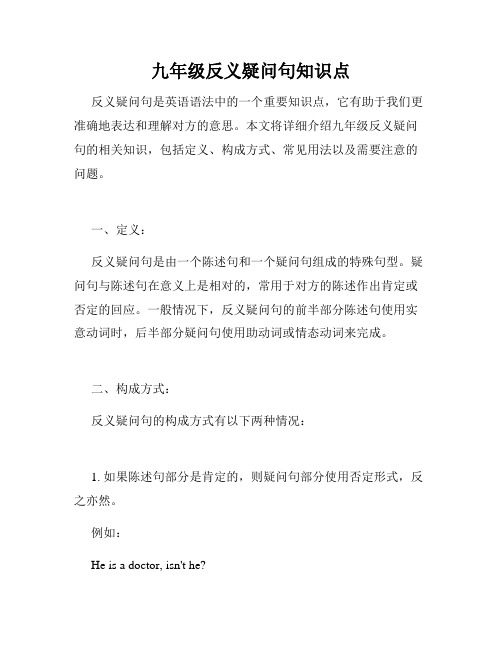
九年级反义疑问句知识点反义疑问句是英语语法中的一个重要知识点,它有助于我们更准确地表达和理解对方的意思。
本文将详细介绍九年级反义疑问句的相关知识,包括定义、构成方式、常见用法以及需要注意的问题。
一、定义:反义疑问句是由一个陈述句和一个疑问句组成的特殊句型。
疑问句与陈述句在意义上是相对的,常用于对方的陈述作出肯定或否定的回应。
一般情况下,反义疑问句的前半部分陈述句使用实意动词时,后半部分疑问句使用助动词或情态动词来完成。
二、构成方式:反义疑问句的构成方式有以下两种情况:1. 如果陈述句部分是肯定的,则疑问句部分使用否定形式,反之亦然。
例如:He is a doctor, isn't he?He isn't a doctor, is he?2. 如果陈述句部分使用助动词或情态动词,疑问句部分使用主要动词。
例如:You can swim, can't you?You can't swim, can you?三、常见用法:九年级阶段,学生需要掌握反义疑问句的常见用法,以下是一些例子:1. 表示请求或征求对方的意见或确认:You will come to the party, won't you?Let's go for a walk, shall we?2. 表示对方的推测并确认:She is your sister, isn't she?3. 表示对方的意见并征求同意或否定:You don't mind if I sit here, do you?4. 表示对方的实际情况并征求确认:You have finished your homework, haven't you?四、需要注意的问题:在使用反义疑问句时,需要注意以下几个问题:1. 人称和时态的一致性:主语的人称和时态需与疑问句的主语相对应,否则会造成语法错误。
例如:She is a doctor, isn't they?(错误)She is a doctor, isn't she?(正确)2. 答案的选择:对于反义疑问句,回答要根据前半部分陈述句而定。
初三英语语法知识汇总 反意疑问句

反意疑问句反意疑问句的构成提出问题和看法,询问对方同不同意。
一般由两部分组成,前一部分用陈述句的形式,后一部分是一个附着在前一部分上的简短问句,两句话的时态要一致。
如果前一部分为肯定式,后一部分通常为否定形式。
例如:Mary's father is a worker, isn’t he? Mary的父亲是工人,对吗?Mary went to the shop yesterday, didn’t she? Mary昨天去商店了,是吗?如果前一部分为否定形式,后一部分就要用肯定形式。
例如:You won’t be away for long, will you? 你不会离开太久,是吗?They aren’t watching TV, are they? 他们没在看电视,对吗?需注意的特殊情况1)反意疑问句的后半部分(附加疑问句)必须在人称、数和时态上与前面的陈述部分保持一致;当前一部分的主语部分为名词时,后一部分的主语用相应的人称代词形式。
例如:Mr. Green went to Shenzhen on business last week, didn’t he?格林先生上周出差去深圳了,是吗?本句中前一部分的谓语动词为一般过去时的行为动词的肯定形式,后一部分的助动词只能是didn’t。
2)带情态动词need的反意疑问句,疑问部分常用need+主语。
例如:We need not read this book, need we?我们不必读这本书,是吗?注意:need既可作情态动词,又可作行为动词。
作行为动词,变反意疑问句时,附加疑问句中只能选用适当的助动词。
例如:The poor man needs our help, doesn’t he?3)have当“有”讲进行反意疑问时,可以添加助动词,也可以不加助动词。
例如:He has few friends in the new school, does / has he?他在新学校里没有什么朋友,是吗?4)省去主语的祈使句的反意疑问句,疑问部分用will you。
英语语法总结反义疑问句
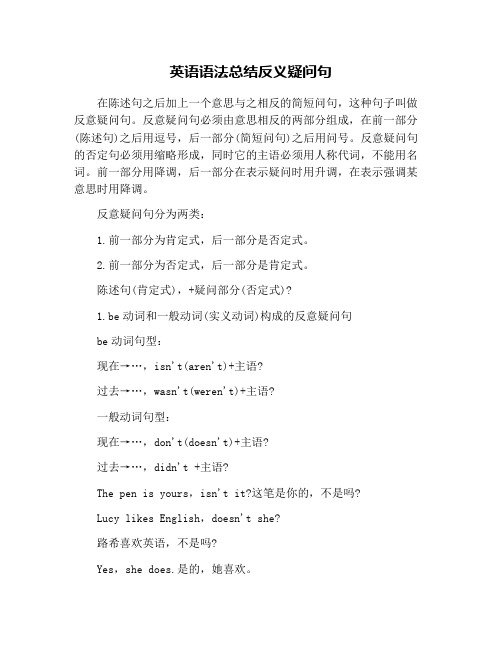
英语语法总结反义疑问句在陈述句之后加上一个意思与之相反的简短问句,这种句子叫做反意疑问句。
反意疑问句必须由意思相反的两部分组成,在前一部分(陈述句)之后用逗号,后一部分(简短问句)之后用问号。
反意疑问句的否定句必须用缩略形成,同时它的主语必须用人称代词,不能用名词。
前一部分用降调,后一部分在表示疑问时用升调,在表示强调某意思时用降调。
反意疑问句分为两类:1.前一部分为肯定式,后一部分是否定式。
2.前一部分为否定式,后一部分是肯定式。
陈述句(肯定式),+疑问部分(否定式)?1.be动词和一般动词(实义动词)构成的反意疑问句be动词句型:现在→…,isn't(aren't)+主语?过去→…,wasn't(weren't)+主语?一般动词句型:现在→…,don't(doesn't)+主语?过去→…,didn't +主语?The pen is yours,isn't it?这笔是你的,不是吗?Lucy likes English,doesn't she?路希喜欢英语,不是吗?Yes,she does.是的,她喜欢。
No,she doesn't.不,她不喜欢。
That was a wonderful night,wasn't it?那是个奇妙的夜晚,不是吗?Yes,it was.是的,它是。
No,it wasn't.不,它不是。
Your sister helped him,didn't she?你姐姐协助了他,不是吗?Yes,she did.是的。
她协助他。
No,she didn't.不。
她没有协助他。
注意反意疑问句中,前后两部分的动词在人称、数和时态上通常保持一致。
另外后一部分的人称代词应和前一部分的主语(名词或代词)保持一致。
Tom is skating,isn't he?(实行时)汤姆在滑冰,不是吗?Yes,he is.是的。
初中英语语法总结:反义疑问句

句初中英语疑问结:反义法总种句子叫做句,这在陈短问述句之后加上一个意思与之相反的简成,在前一部分由意思相反的两部分组反意疑问句。
反意疑问句必须(陈述句) 之后用逗号,后一部分(简短问句) 之后用问号。
反意疑问句用人称代词必须,不能用名用缩的否定句必须略形成,同时它的主语词。
前一部分用降调,后一部分在表示疑问时用升调,在表示强调某。
用降调意思时:两类句分为反意疑问1. 前一部分为肯定式,后一部分是否定式。
2. 前一部分为否定式,后一部分是肯定式。
陈述句( 肯定式) ,+疑问部分( 否定式)?1.be动词和一般动词(实义动词)构成的反意疑问句be动词句型:现在→⋯,isn't(aren't)+ 主语?过去→⋯,wasn't(weren't)+ 主语?词句型:一般动现在→⋯,don't(doesn't)+ 主语?过去→⋯,didn't + 主语?The pen is yours ,isn't it?这笔是你的,不是吗?Lucy likes English ,doesn't she??,不是吗英语路希喜欢Yes,she does. 是的,她喜欢。
No,she doesn't. 不,她不喜欢。
That was a wonderful night ,wasn't it?那是个奇妙的夜晚,不是吗?Yes,it was. 是的,它是。
No,it wasn't. 不,它不是。
Your sister helped him ,didn't she?你姐姐协助了他,不是吗?Yes,she did. 是的。
她协助他。
No,she didn't. 不。
她没有协助他。
注意反意疑问句中,前后两部分的动词在人称、数和时态上通常保持一致。
另外后一部分的人称代词应和前一部分的主语( 名词或代词) 保持一致。
Tom is skating ,isn't he?( 实行时)汤姆在滑冰,不是吗?Yes,he is. 是的。
初中英语语法总结:反义疑问句
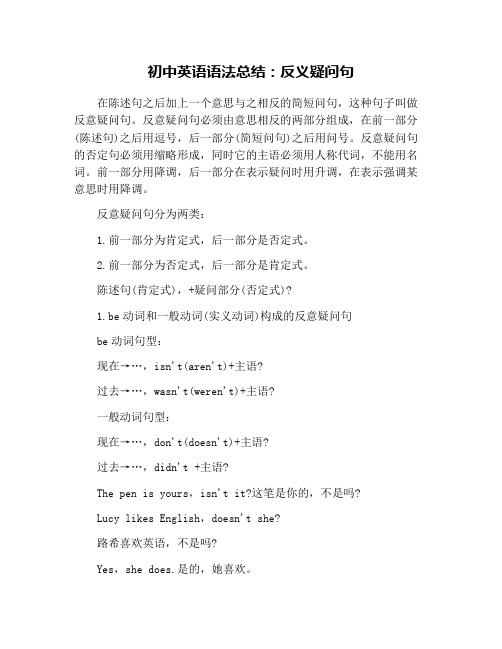
初中英语语法总结:反义疑问句在陈述句之后加上一个意思与之相反的简短问句,这种句子叫做反意疑问句。
反意疑问句必须由意思相反的两部分组成,在前一部分(陈述句)之后用逗号,后一部分(简短问句)之后用问号。
反意疑问句的否定句必须用缩略形成,同时它的主语必须用人称代词,不能用名词。
前一部分用降调,后一部分在表示疑问时用升调,在表示强调某意思时用降调。
反意疑问句分为两类:1.前一部分为肯定式,后一部分是否定式。
2.前一部分为否定式,后一部分是肯定式。
陈述句(肯定式),+疑问部分(否定式)?1.be动词和一般动词(实义动词)构成的反意疑问句be动词句型:现在→…,isn't(aren't)+主语?过去→…,wasn't(weren't)+主语?一般动词句型:现在→…,don't(doesn't)+主语?过去→…,didn't +主语?The pen is yours,isn't it?这笔是你的,不是吗?Lucy likes English,doesn't she?路希喜欢英语,不是吗?Yes,she does.是的,她喜欢。
No,she doesn't.不,她不喜欢。
That was a wonderful night,wasn't it?那是个奇妙的夜晚,不是吗?Yes,it was.是的,它是。
No,it wasn't.不,它不是。
Your sister helped him,didn't she?你姐姐协助了他,不是吗?Yes,she did.是的。
她协助他。
No,she didn't.不。
她没有协助他。
注意反意疑问句中,前后两部分的动词在人称、数和时态上通常保持一致。
另外后一部分的人称代词应和前一部分的主语(名词或代词)保持一致。
Tom is skating,isn't he?(实行时)汤姆在滑冰,不是吗?Yes,he is.是的。
中考英语语法学案(反义疑问句)
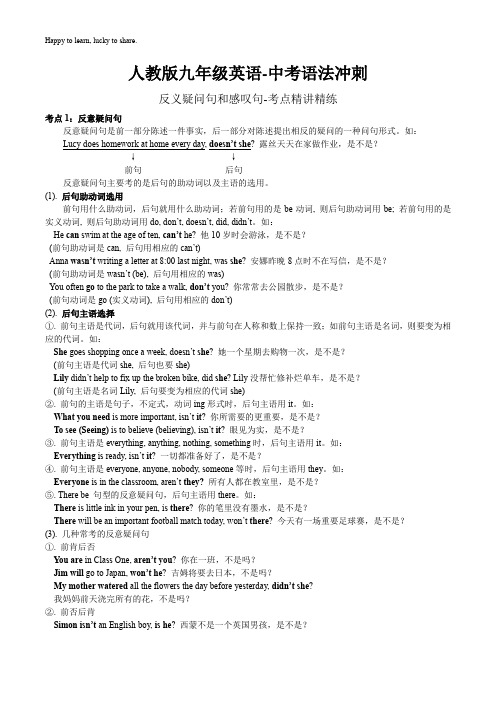
人教版九年级英语-中考语法冲刺反义疑问句和感叹句-考点精讲精练考点1:反意疑问句反意疑问句是前一部分陈述一件事实,后一部分对陈述提出相反的疑问的一种问句形式。
如:Lucy does homework at home every day, doesn’t she? 露丝天天在家做作业,是不是?↓↓前句后句反意疑问句主要考的是后句的助动词以及主语的选用。
(1). 后句助动词选用前句用什么助动词,后句就用什么助动词;若前句用的是be动词, 则后句助动词用be; 若前句用的是实义动词, 则后句助动词用do, don’t, doesn’t, did, didn’t。
如:He can swim at the age of ten, can’t he? 他10岁时会游泳,是不是?(前句助动词是can, 后句用相应的can’t)Anna wasn’t writing a letter at 8:00 last night, was she? 安娜昨晚8点时不在写信,是不是?(前句助动词是wasn’t (be), 后句用相应的was)You often go to the park to take a walk, don’t you? 你常常去公园散步,是不是?(前句动词是go (实义动词), 后句用相应的don’t)(2). 后句主语选择①. 前句主语是代词,后句就用该代词,并与前句在人称和数上保持一致;如前句主语是名词,则要变为相应的代词。
如:She goes shopping once a week, doesn’t she? 她一个星期去购物一次,是不是?(前句主语是代词she, 后句也要she)Lily didn’t help to fix up the broken bike, did she? Lily没帮忙修补烂单车,是不是?(前句主语是名词Lily, 后句要变为相应的代词she)②. 前句的主语是句子,不定式,动词ing形式时,后句主语用it。
初中英语语法总结反义疑问句
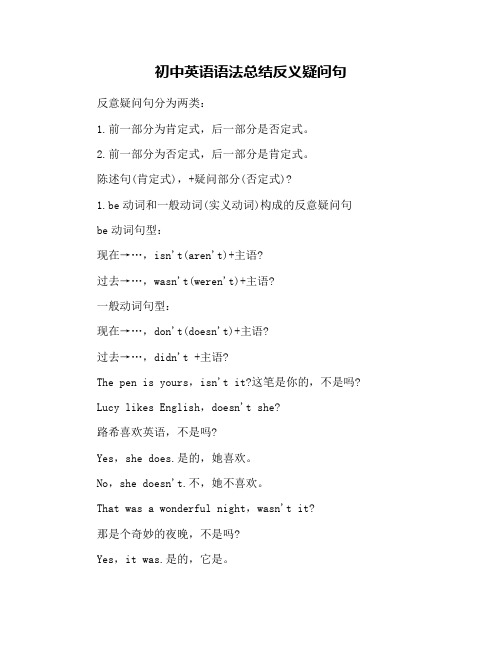
初中英语语法总结反义疑问句反意疑问句分为两类:1.前一部分为肯定式,后一部分是否定式。
2.前一部分为否定式,后一部分是肯定式。
陈述句(肯定式),+疑问部分(否定式)?1.be动词和一般动词(实义动词)构成的反意疑问句be动词句型:现在→…,isn't(aren't)+主语?过去→…,wasn't(weren't)+主语?一般动词句型:现在→…,don't(doesn't)+主语?过去→…,didn't +主语?The pen is yours,isn't it?这笔是你的,不是吗? Lucy likes English,doesn't she?路希喜欢英语,不是吗?Yes,she does.是的,她喜欢。
No,she doesn't.不,她不喜欢。
That was a wonderful night,wasn't it?那是个奇妙的夜晚,不是吗?Yes,it was.是的,它是。
No,it wasn't.不,它不是。
Your sister helped him,didn't she?你姐姐协助了他,不是吗?Yes,she did.是的。
她协助他。
No,she didn't.不。
她没有协助他。
注意反意疑问句中,前后两部分的动词在人称、数和时态上通常保持一致。
另外后一部分的人称代词应和前一部分的主语(名词或代词)保持一致。
Tom is skating,isn't he?(实行时)汤姆在滑冰,不是吗?Yes,he is.是的。
No,he isn't.不。
She is loved by her parents,isn't she?(被动语态)她被她父母亲疼爱着,不是吗?Yes,she is.是的。
No,she isn't.不。
实行时和被动语态的反意疑问句的形式和be动词、一般动词的反意疑问句句型一样。
中考英语语法专题系列-反义疑问句+倒装句

Chapter Twelve 反义疑问句&倒装句反义疑问句反义疑问句概述:反义疑问句表示的是:某人/物(没有)做了什么,(不)是吗?例:Jack doesn’t like playing football, does he?反义疑问句特点:1.前肯后否:主句为肯定,反义疑问部分为否定句2.前否后肯:主句为否定或含有表示否定意义的词时,反义疑问部分为肯定。
常见的表否定意义的词:never, seldom, no, few, little, hardly等。
例:Tom has never been to Beijing before, has he?反义疑问句结构:(考察重点)反义疑问部分构成:be/情态动词/助动词/will/ have(has/had完成时态中)+(not) +主语;注意:上述词的选择根据主句中谓语的情况而定,和一般疑问句的构成一致。
例:Lucy has few friends here, does she?Tony can swim, can’t he?They will go to Shanghai next week, won’t they?反义疑问句的回答:(考察重点)回答宗旨:根据主句所说的事实回答,陈述是真的,则用Yes回答,反之用No回答。
注意:没有Yes, he doesn’t. 或者No, he is. 之类的回答!!!!例:You are not a girl, are you?你是女孩的回答:Yes, I am. 不,我是。
你不是女孩的回答:No, I am not. 是,我不是。
中考中部分特殊的反义疑问句:(考察较少)1.Let’s go shopping tonight,__shall we____?2.Let us go shopping tonight, __will you___?3.Go shopping with me, ___will you____?4.Don’t go out, ___will you___?5.I think/believe he is right, __isn’t he____?6.I don’t think/believe he is right,__is he____?倒装句倒装句概述:一种语法手段,用于表示一定的句子结构或强调句子成分。
初中英语语法大全之反意疑问句
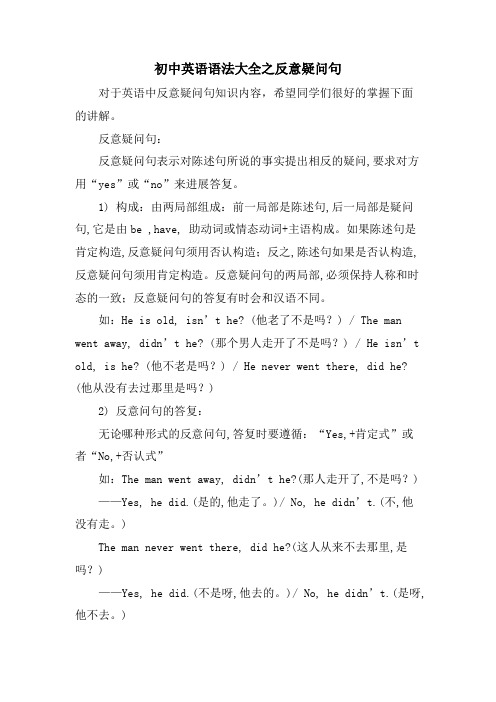
初中英语语法大全之反意疑问句
对于英语中反意疑问句知识内容,希望同学们很好的掌握下面
的讲解。
反意疑问句:
反意疑问句表示对陈述句所说的事实提出相反的疑问,要求对方用“yes”或“no”来进展答复。
1) 构成:由两局部组成:前一局部是陈述句,后一局部是疑问句,它是由be ,have, 助动词或情态动词+主语构成。
如果陈述句是肯定构造,反意疑问句须用否认构造;反之,陈述句如果是否认构造,反意疑问句须用肯定构造。
反意疑问句的两局部,必须保持人称和时态的一致;反意疑问句的答复有时会和汉语不同。
如:He is old, isn’t he? (他老了不是吗?) / The man went away, didn’t he? (那个男人走开了不是吗?) / He isn’t old, is he? (他不老是吗?) / He never went there, did he? (他从没有去过那里是吗?)
2) 反意问句的答复:
无论哪种形式的反意问句,答复时要遵循:“Yes,+肯定式”或
者“No,+否认式”
如:The man went away, didn’t he?(那人走开了,不是吗?) ——Yes, he did.(是的,他走了。
)/ No, he didn’t.(不,他
没有走。
)
The man never went there, did he?(这人从来不去那里,是吗?)
——Yes, he did.(不是呀,他去的。
)/ No, he didn’t.(是呀,他不去。
)
相信上面对英语语法反意疑问句知识的讲解学习,同学们已经能很好的掌握了吧,希望同学们会学习的很好。
2023年中考英语语法复习反义疑问句

she ?/ hasn’t she?
2.do 助动词(用的 多)
2.have “生病,吃 she had a cold,didn’t she ? 根据实义动词选 喝玩乐,实义动 Tom has a bath,doesn’t he? 择对应的助动词
词”以及have to
英语专项:反义疑问句
have的用法
9. ---You have been to Shanghai before, haven’t you? ---Yes I have. /No, I haven’t.
10. —You haven’t been to the West Lake, have you?
—__A___. But I will go there with my parents this summer vacation.
7. ---The boys will play games, won’t they? ---Yes, they will. /No, they won’t.
8. ---It won’t stop raining, will
it?
---Yes, it will. /No, it won’t.
英语专项:反义疑问句
14.Be quick, will you ?
15.Don’t be late again, will you ?
16.Do it at once, will you
?
17.Let me have a try, will you ?
18.Let us leave now, will you
?
英语专项:反义疑问句
3.陈述句的主语是指示代词this/that, 疑问部分的主语用it;主语是these/ This is an English car, isn’t it? those,疑问部分用they
中考反义疑问句 特殊句式-反义疑问句

中考反义疑问句特殊句式-反义疑问句专题复习-反义疑问句反义疑问句结构:前否后肯,或前肯后否1.当陈述句部分的主语是不定代词no one,none,nobody,everyone,someone,everybody,somebody 等时,其附加疑问句的主语强调全部时可用they,强调个体时用he.No one phoned me while I was out,did they?Everyone is having a good time, aren`t they?Someone is waiting for you,isn`t he?2.陈述句的主语是复合不定代词everything,anything,something,nothing,附加疑问句部分主语用it.Everything goes well with you,doesn`t it?Nothing has been considered about this meeting,has it?3.不定代词one作主语,附加疑问句的主语在正式场合用one,非正式场合用you.One can`t be too careful,can one/you?4.当陈述句的主语是指示代词,附加疑问句主语要用相应的人称代词,即this/that用it,these/those用they.That was a hundred years ago,wasn`t it?Those are yours,aren`t they?5.陈述句部分为there be句型时,其后附加疑问句部分仍用there.There will be a special meeting tomorrow,won`t there?There used to be a lake here,usedn`t/didn`t there?6.情态动词must在反义疑问句中的用法,应由陈述部分的意义来决定。
反义疑问句语法总结
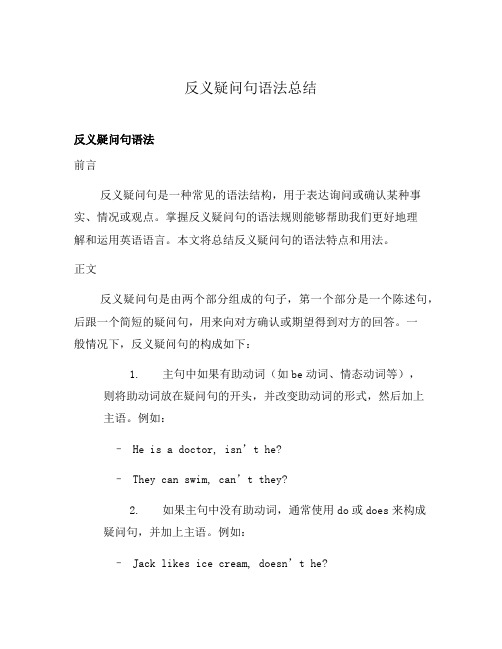
反义疑问句语法总结反义疑问句语法前言反义疑问句是一种常见的语法结构,用于表达询问或确认某种事实、情况或观点。
掌握反义疑问句的语法规则能够帮助我们更好地理解和运用英语语言。
本文将总结反义疑问句的语法特点和用法。
正文反义疑问句是由两个部分组成的句子,第一个部分是一个陈述句,后跟一个简短的疑问句,用来向对方确认或期望得到对方的回答。
一般情况下,反义疑问句的构成如下:1.主句中如果有助动词(如be动词、情态动词等),则将助动词放在疑问句的开头,并改变助动词的形式,然后加上主语。
例如:–He is a doctor, isn’t he?–They can swim, can’t they?2.如果主句中没有助动词,通常使用do或does来构成疑问句,并加上主语。
例如:–Jack likes ice cream, doesn’t he?–She plays the piano, doesn’t she?3.当主句中含有否定词(如n’t),则将否定形式的助动词放在疑问句的开头,再加上主语。
例如:–They haven’t seen the movie, have they?–She isn’t c oming, is she?4.如果主句中是肯定的陈述句,疑问句部分一般使用否定形式,反之亦然。
例如:–You are going to the party, aren’t you?–He doesn’t like coffee, does he?除了构成疑问句的助动词或do/does之外,其他词的形式不发生变化。
而陈述句和疑问句的主语一般保持一致,即如果主句的主语是第三人称单数形式,那么疑问句的主语也应为第三人称单数形式。
反义疑问句常用于以下情况:•提出询问或确认的问题,寻求对方的回答或意见;•用于社交场合,以便获得更多的信息或确认对方的观点;•表达自己的疑虑、不确定或期待。
结尾反义疑问句是英语中常见的语法结构之一,掌握其构成和使用规则对于提高英语交流能力非常重要。
中考英语语法反意疑问句对应规则
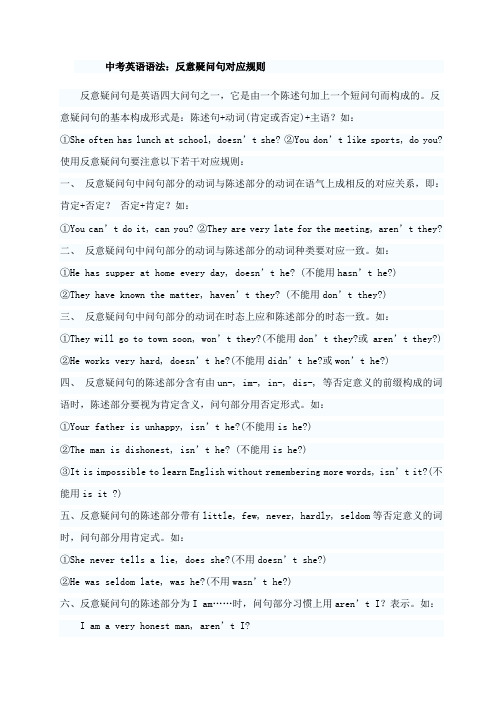
中考英语语法:反意疑问句对应规则反意疑问句是英语四大问句之一,它是由一个陈述句加上一个短问句而构成的。
反意疑问句的基本构成形式是:陈述句+动词(肯定或否定)+主语?如:①She often has lunch at school, doesn’t she?②You don’t like sports, do you? 使用反意疑问句要注意以下若干对应规则:一、反意疑问句中问句部分的动词与陈述部分的动词在语气上成相反的对应关系,即:肯定+否定?否定+肯定?如:①You can’t do it, can you? ②They are very late for the meeting, aren’t they?二、反意疑问句中问句部分的动词与陈述部分的动词种类要对应一致。
如:①He has supper at home every day, doesn’t he? (不能用hasn’t he?)②They have known the matter, haven’t they? (不能用don’t they?)三、反意疑问句中问句部分的动词在时态上应和陈述部分的时态一致。
如:①They will go to town soon, won’t they?(不能用don’t they?或aren’t they?)②He works very hard, doesn’t he?(不能用didn’t he?或won’t he?)四、反意疑问句的陈述部分含有由un-, im-, in-, dis-, 等否定意义的前缀构成的词语时,陈述部分要视为肯定含义,问句部分用否定形式。
如:①Your father is unhappy, isn’t he?(不能用is he?)②The man is dishonest, isn’t he? (不能用is he?)③It is impossible to learn English without remembering more words, isn’t it?(不能用is it ?)五、反意疑问句的陈述部分带有little, few, never, hardly, seldom等否定意义的词时,问句部分用肯定式。
- 1、下载文档前请自行甄别文档内容的完整性,平台不提供额外的编辑、内容补充、找答案等附加服务。
- 2、"仅部分预览"的文档,不可在线预览部分如存在完整性等问题,可反馈申请退款(可完整预览的文档不适用该条件!)。
- 3、如文档侵犯您的权益,请联系客服反馈,我们会尽快为您处理(人工客服工作时间:9:00-18:30)。
反义疑问句1.Zhou Ming has few English magazines,_____?A.does heB.doesn’t heC.has heD.hasn’t he2.Cindy could hardly speak English three years ago, ________?A. couldn't she?B. could sheC. can she3. Alice had a wonderful time yesterday,_______?A. hadn’t sheB. wasn’t sheC. didn’t sheD. wouldn’t she4.–She didn’t come to schoolyesterday, did she?–______, though she was not feeling well.A. No, she didn’tB. Yes, she didn’tC. No, she didD. Yes, she did5.---He hardly spent any time on his subjects, ________?---________, so he does badly in his lessons.A .didn’t he, Yes B. did he, YesC. didn’t he, NoD. did he, No6.He’s read this book before, ?A. hasn’t heB. doesn’t heC. isn’t heD. wasn’t he7.– Let’s go for a walk, ______?-- OK, I’m coming . Don’t forget to bring your camera, ______?A. will you; will youB. will you; shall weC. shall we; shall weD. shall we; will you8.John had a short walk after lunch, ________?A. did heB. didn't heC. had heD. hadn't he9. Nancy hardly rings you up, ___________?A. doesn’t sheB. does sheC. doesn’t NancyD. does Nancy10.---Your brother often disagrees with you, _______ he ?--- _______. We often have different opinions.A.does; YesB. doesn’t ;YesC. does; NoD. doesn’t; No11.Kate’s never late for school, ?A.isn’t sheB.hasn’theC.is sheD.has she12.--- Liu Tao has never read the book The Adventure of Tom Sawyer , _________ he? --- _________. He told me it's very interesting. He'd like to read it again. A. is; No, he isn't B. has; Yes, he hasC. isn’t; Yes, he isD. hasn’t; No, he hasn't13.—He’s never late for school, ________ ?—No, he isn’t .He is always very early.A. is heB. isn’t heC. hasn’t heD. has he14.—There’s little meat left in the fridge, ________?—________. I’ll get some on my way home.A. is there, YesB. isn’t there, YesC. is there, NoD. isn’t there, No15.—Tom finished his homework, didn’t he?—__________, though he was ill yesterday.A. No, he didn’tB. Yes, he didC. Yes, he doesD. No, he doesn’t16.There is little water in the cup, ?A. is thereB. isn’t thereC. isn’t it17. He’s still not understood by his close friend although he has said sorry to him, _________?A. hasn’t heB. has heC. isn’t heD. is he18. You have never visited the place before, you?A. didB. didn’tC. haveD. haven’t19. Don't keep poison in the kitchen, _______?A. do youB. shall weC. will youD. don't you20. There are no museums in our city, _________?A. aren’t thereB. are thereC. is thereD. isn’t there21.Your father is playing the piano very well, he?A.isB.isn’tC.doesD.doesn’t22.— It’s her birthday tomorrow, ______ ?— Yes, let’s have a surprise party for her.A. isn’t itB. isn’t sheC. doesn’t itD. doesn’t she23.--- He’s never stolen anything before, _______ he?--- ________. It’s his third time to be taken to the police station.A. hasn’t; YesB. has; NoC. has; YesD. is; No24.— It’s her birthday tomorrow, ______ ?— Yes, let’s have a surprise party for her.A. isn’t itB. isn’t sheC. doesn’t itD. doesn’t she25.-----Your father never watched the drama series on TV, __________?-----_____________________. He thinks theses drama series are boring and dull.A.does he; Yes, he does.B. does he; No, he doesn’tC. doesn’t he ; Yes, he does.D. doesn’t he ; No, he doesn’t .26.—Tom is an honest boy, _______ he?—Yes. We trust him all the time.A. isn’tB. isC. doesD. doesn’t27.Good, you’ve done it well! You need no more help from us, ______.?A. do youB. need youC. don’t youD. needn’t you28.His father had an important meeting just now, _______?A. did heB. had heC. didn't heD. hadn't he29. -- You used to be short, didn’t you?-- _______. I was the shortest in my class.A. Yes, I did.B. No, I didn’t.C. Yes, I was.D. No, I wasn’t.30.The farmer is working now. He’s fed the horse and the sheep, _____?A. doesn’t heB. isn’t heC. wasn’t heD. hasn’t heABCDD ADBBB CBACB ADCCB BACCA AACAD参考答案1.A【解析】试题分析:句意为:周明几乎没有英语杂志对吗?这是一个反义疑问句,反义疑问句的结构遵循前肯定后否定或者前否定后肯定,前后人称、时态一致的原则。
结合语境可知,few有否定意义,故应选A。
考点:考查反义疑问句。
2.B【解析】试题分析:hardly意为“几乎不”,是一个否定意义的副词,反意疑问句要遵循“前肯后否,前否后肯”的原则,句意:Cindy三年前几乎不能讲英语,不是吗?故选B。
考点:考查反意疑问句的用法。
3.C【解析】试题分析:句意:爱丽丝昨天过得很愉快,对吗?所以选C。
考点:考查反意疑问句。
【答案】D【解析】试题分析: 句意:昨天她没有来学校是吗?不,尽管她感觉不舒服,但是她还是来了。
此题考查反意疑问句,根据句意,故选D。
考点:考查反意疑问句的答语。
5.D【解析】试题分析:句意:他几乎不在功课上花费时间,是吗?是,所以他功课很差。
前面有hardly 表否定,所以反义疑问句用肯定的,排除A、C,根据后面的答句说他课程学得很差,表示他几乎不学习,所以选No,表示不学习的意思。
考点: 考查反意疑问句。
6.A【解析】试题分析:句意:以前他已经读过这本书了,不是吗?因为前面的缩写代表的是has,反意疑问句,前肯定,后否定,选A。
考点:考查反意疑问句.7.D【解析】试题分析:句意:咱们去散散步,好吗?好吧,我就来。
